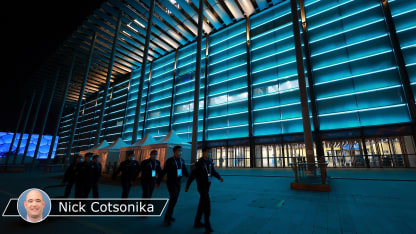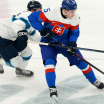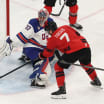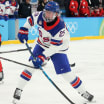The caveat to the NHL's promise to the players always was that COVID-19 did not materially disrupt the NHL season, and now, without question, it has.
Many players, coaches and staff members have tested positive across the NHL. Fifty games have been postponed, including 32 this week. Commissioner Bettman said the League will use the Feb. 6-22 window set aside for Beijing to "reschedule games that have been, or may yet be, postponed."
The NHL has worked with the NHL Players' Association every step of the way.
"Certainly, the players and hockey fans are quite disappointed," NHLPA executive director Don Fehr said in a separate statement. "But playing a full 82-game season this year, something the pandemic has prevented us from doing since the 2018-19 season, is very important. We expect that NHL players will return to the Olympics in 2026."
Meanwhile, in the background, this is the reality: The 2022 Beijing Olympics would not have been the experience of which the players dreamed, and would have presented significant risks.
The COVID-19 protocols were unclear until last week, when the International Olympic Committee, International Paralympic Committee and Beijing Organizing Committee issued an updated, 84-page playbook.
The Olympics are supposed to be about best-on-best competition, national pride and pageantry. Especially in a place like Beijing for Europeans and North Americans, they're also supposed to be about seeing a new place, meeting new people and sharing it all with your loved ones.
But in Beijing, players, coaches and staff members would have been confined to what the playbook called a "closed loop" -- in other words, a bubble separated from the city. They would have been subjected to constant testing, monitoring, masking and physical distancing. Their families and friends would have been unable to join them. The only spectators would have been mainland Chinese subject to protocols.
The vast majority of players would have accepted that. They have accepted restrictions to varying degrees to play in the NHL during the pandemic and will continue to. The NHL and NHLPA enacted enhanced protocols Saturday.
But it's more than that. The omicron variant of the virus that causes COVID-19 is racing around the world, increasing the chances of infection, and positive test results at the Olympics will trigger the following:
If asymptomatic, participants will stay in an isolation facility until they receive two negative test results 24 hours apart.
If symptomatic, they will stay in a hospital until their temperature returns to normal for three straight days, their respiratory symptoms improve significantly, their lung imaging improves significantly, they receive two negative test results 24 hours apart and they show no other symptoms.
Their status will be up to a 20-member "Medical Expert Panel," composed of the China Center for Disease Control and the Beijing CDC, plus five international experts from the IOC, IPC and sports federations.
"We draw to your attention that risks and impacts may not be fully eliminated and that you agree to attend the Olympic and Paralympic Winter Games at your own risk," it says on Page 82 of the playbook.
NHL players went to five Olympics from 1998-2014, then didn't go to PyeongChang in 2018.
Based on experience, the NHL feels stopping its season so the players can perform in someone else's tournament hurts more than helps, especially when the Olympics are not held in North America. The players disagree and cherish Olympic participation.
But that isn't the issue now. It comes down to this:
The NHL is the livelihood of the players and so many other people in and around the League. It must come first.
The spread of COVID-19 in the general population is out of the NHL's control. So is the response of governments from Canada to the United States to China.
It isn't worth the risk of testing positive and having to go to an isolation center or a hospital on the other side of the world for an indefinite time, under the care and control of an unfamiliar panel.
As badly as the players want to participate in the Olympics, the focus must be health, safety and the NHL season. The hope is that the pandemic will pass and won't be an issue for 2026.


















